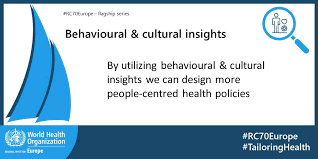Behavioural and cultural insights for health

Behavioural and cultural insights for health / WHO
Many
factors that affect our health and well-being are not medical, but rather
social, cultural, political, psychological or economic. Behavioural and
cultural insights for health refers to knowledge derived from the social
sciences and health humanities that helps us to better understand the drivers
and barriers to achieving the highest attainable standard of health. These
insights are often context dependent, and can be used in the design,
implementation and evaluation of health policies to ensure that they are
effective, acceptable and equitable.
WHO
provides technical guidance and expertise to countries on best practices for
leveraging behavioural and cultural insights in health policy and planning. In
April 2020, WHO established the Insights Unit as a flagship initiative to
coordinate and lead these efforts.
Collaborating
with a broad range of partners and across sectors, this initiative seeks new
approaches to complex health challenges. It is guided by 4 principles:
·
evidence: draw on evidence, test and evaluate it, and disseminate good
practice;
·
context: generate
socially nuanced, culturally sensitive, people-centred health insights;
·
scale: support the
scale-up of interventions with proven impact; and
· partnership: work with experts, transformers, colleagues and critics.





